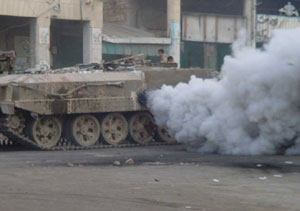DominionSections
Browse Articles
- IndependentMedia.ca
- MostlyWater.org
- Seven Oaks
- BASICS Newsletter
- Siafu
- Briarpatch Magazine
- The Leveller
- Groundwire
- Redwire Magazine
- Canadian Dimension
- CKDU News Collective
- Common Ground
- Shunpiking Magazine
- The Real News
- Our Times
- À babord !
- Blackfly Magazine
- Guerilla News Network
- The Other Side
- The Sunday Independent
- Vive le Canada
- Elements
- ACTivist Magazine
- The Tyee
- TML Daily
- New Socialist
- Relay (Socialist Project)
- Socialist Worker
- Socialist Action
- Rabble.ca
- Straight Goods
- Alternatives Journal
- This Magazine
- Dialogue Magazine
- Orato
- Rebel Youth
- NB Media Co-op
Radio
Snapshot of an Occupied Land
October 20, 2003
Snapshot of an Occupied Land
Jenin is well known as the fiercest centre of resistance in the West Bank, but it is difficult to see how shooting children regularly and enforcing a suffocating and unrelenting curfew day after day eases that resistance. Intuitively, it seems obvious that such actions only serve to entrench it.

An Israeli armoured personnel carrier sprays smoke and machine gun fire while enforcing a 24-hour curfew in Jenin. photo: Valerie Zink/FromOccupiedPalestine.org
The most recent bombing, in Haifa (where from, incidentally, almost all of this refugee camp was once expelled), was carried out on October fourth by a 27 year-old woman who was a lawyer from Jenin. Perhaps this reasoning works for the eight days of curfew so far in October, but what of the 21 days in September?
The UN engineer explained the army's rationale with a story of his own arbitrary arrest several months earlier. He was manacled, blindfolded, held on his knees for hours, beaten, and taken to the infamous Salem prison where he stayed for eleven days without charge or defence. "They want us only because we are from Jenin. That's all. They even tell us this."
Yet, after almost two weeks of being constantly on the streets photographing, I have still not seen a single Palestinian gunman. Rather, it is the subtle forms of resistance, what the rest of the world might call "life," that seem to be occupying the overwhelming majority of the Israeli military's time and budget.
During the first few days of curfew, the city looked like a ghost town, the population holed up under collective house arrest. But the last few days have seen more and more people moving about.
On the main street, coffee vendors and vegetable carts have begun to reappear and people are emerging from their homes to get food and medicine, drink coffee, and just sit on the sidewalks and talk. Shops are opening one fold of their steel doors to allow a slim entrance, and a small market has even established itself less than twenty feet from the central site of the stone throwing and machine gunning.
In response, the tanks are now enforcing the curfew steadily all day, circling the city, passing up and down the main street firing their machine guns, tearing up the boulevards and spraying the sidewalks and homes with a thick diesel smokescreen that leaves the midday sunshine looking like the densest of maritime fog, taking several minutes to clear.
Before the tanks reach the main street, someone will come running up the road yelling "they're coming!" and the shopkeepers quickly seal their steel doors, the adults scurry down the alleys leaving their coffee cups where they were, the photographers get in position and the children prepare their stones.
The tanks pass, shooting hundreds of rounds and spraying clouds of smoke as the children heave their stones - while some play a terrifying game where they mount the back of the tank and ride the enormous death machine in a way that leaves them oddly untouchable since the mounted gun cannot shoot down at itself.
By the time the clouds of smoke have cleared, the men are back in their seats drinking their coffee, the stores have opened the one fold of their steel doors and the children are crowding around the Palestinian photographers to see if their picture will be sent around the world by the Agence France Press or Associated Press. And so it goes, hour after hour.
Related articles:
By the same author:
Archived Site
The Dominion is a monthly paper published by an incipient network of independent journalists in Canada. It aims to provide accurate, critical coverage that is accountable to its readers and the subjects it tackles. Taking its name from Canada's official status as both a colony and a colonial force, the Dominion examines politics, culture and daily life with a view to understanding the exercise of power.